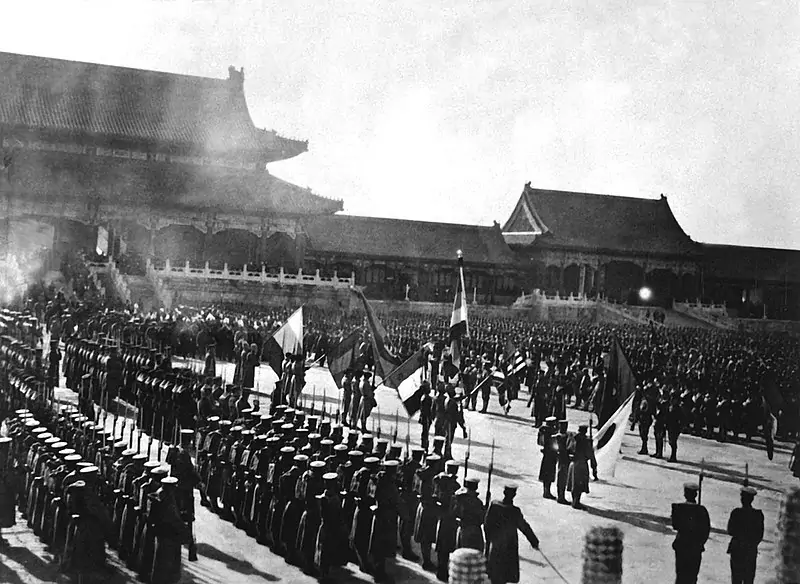By Pat Welsh, contirbutor
The formal end of the Boxer Rebellion occurred on Sept. 7, 1901, when the Boxer Protocol (辛丑各國和約) was signed. This Boxer Protocol and the suppression of the Boxer Rebellion in Beijing the previous year, which left behind very unpleasant consequences for the aging Dowager Empress Cixi (慈禧太后), the Chinese civilians in north and northeastern China, the Qing Manchu Court and China in particular.
For Cixi, as the western forces were entering Beijing, she was forced to abandon her luxurious palace in Beijing’s Forbidden City, dress as an ordinary farm woman and flee to Xian in three wooden oxcarts along with a personal attendant, a retinue of Gansu Guards and the previously imprisoned Guangxü Emperor (光緒帝) in tow. There Cixi was forced to suffer a humiliating rebuke from the emperor who had briefly felt empowered by the events at that time. Recall that he had favored the reforms that Cixi had overturned once her 1898 coup d’ etat had succeeded. Her flight was explained as being a tour of inspection but this explanation fooled no one.
Beijing and several cities in northern China were occupied for a year by the international expeditionary forces. There were frequent atrocities against civilians especially by French, German, Japanese and Russian soldiers who seemed to take the attitude that any Chinese civilian that fell into their hands were either Boxers or their supporters. British and American personnel also participated in the looting that occurred. To make matters worse, German and French troops also undertook brutal punitive military actions that included looting in the rural areas around Beijing and other areas of northern China. Finally, supported and encouraged by American and British officials, Yuan Shikai (袁世凱), who had previously expelled the Boxers out of Shandong before the rebellion, undertook a two =-year campaign to finally wipe out the Boxers in Zhili and once again in neighboring Shandong province.
On Sept.21, 1900 Russian forces seized Jilin and the Liaodong peninsula. By October, their forces had moved northward and occupied all of Manchuria. Eventually this seizure conflicted with Japanese interests in that area and this occupation would lead to the outbreak of the Russo-Japanese War in 1904.
As for the terms of the Boxer Protocol, China found that her Dagu forts (大沽砲台) guarding Beijing had to be leveled. Another provision allowed foreign troops to protect the legations of the Western Powers in Beijing and that there would be a special area reserved for their use under exclusive allied control, in which Chinese shall not have the right to reside. The Zongli Yamen (總理衙門) that had been charged with dealing with all foreign affairs was replaced with a Foreign Office, which ranked above the other six boards in the government. Another provision required in the Chinese government to prohibit forever, under the pain of death, membership in any anti-foreign society. As a punishment, civil service examinations were to be suspended for five years in all areas where foreigners were massacred or subjected to cruel treatment. Provincial and local officials would personally be held responsible for any future anti-foreign incidents. On the military front China was weakened by the provision that the importation of weapons into China was prohibited for two years with a possible second two =-year extension if the western powers deemed it necessary. Another humiliation for China was that she would be required to pay indemnities to the western nations in the form of fines of some 450 million silver taels, the equivalent of more than US$330 million at that time. Another provision required that China had to execute a number of high-ranking officials who played key roles in bringing about the Boxer Rebellion. Governor Yü Xian who headed the Boxer Movement during the attacks on the foreign legations and nine other were executed, but two other major players, expected to be executed, General Dong Fuxiang (董福祥) whose soldiers killed the Japanese secretary Akira Sugiyama (杉山 彬) and Prince Zaiyi (載漪), were spared and sent away from Beijing. Finally, the emperor was required to apologize to Germany and Japan for the slaying of Baron von Ketteler and Sugiyama. Cixi allowed these humiliations because she was allowed to remain on the throne as the dowager empress.
The $30 million portion to be paid to the United States was reduced to $10.6 million, most of which financed a program envisioned by U.S. Secretary John Hay and approved by President Roosevelt and the Chinese ambassador, Liang Cheng. This program brought Chinese individuals to American universities. The Chinese students learned English and other useful subjects. The students were then to return to China to teach others. From this $10.6 million and the original program, Qinghua University (清华大学) in Beijing was created.
One consequence of the Boxer Rebellion to China was that the Western Powers gave up the idea of colonializing China. It seemed more preferable to work with China through its imperial administration.
Another consequence was the initiation of some reforms approved by the dowager empress. In 1901 she introduced new policies. Under these new policies, the former civil service exam with its complicated literary “eight-legged” essays were gone forever. Education in the Chinese classics was replaced by a European educational system leading to a university degree. New police and military organizations were established for the purpose of modernizing both. Taxation policies were revamped and tariffs were establish enabling China to raise the funds needed for reparation payments to the various Western nations. Finally some bureaucratic efficiency measure were undertaken in the central government. After the strange death of the Guangxu Emperor on Nov. 14, 1908, and the death of the empress dowager one day later, the brother of the Guangxu Emperor, the regent Prince Chun (醇親王), launched other reforms. (In 2008, it was learned that the level of arsenic in the Guangxü Emperor’s body was over 2000 times that of normal people. The two people most believed to be involved were either the Dowager Empress Cixi who feared the Emperor’s reversals of her policies after her death and Yuan Shikai who feared being executed for treason if the Guangxu Emperor were to assume the throne again. Using his military forces, Yuan had completely controlled all the approaches to Beijing through which he could utilize either to protect the Court from threatened attack or to crush the Emperor should he himself desire to assume Imperial power. After Cixi’s death, Prince Chun acted as regent for China’s new Emperor, the 3-year-old infant, Henry Puyi (溥儀).
For the Qing Dynasty, it had been permanently weakened. Anti-Qing feelings gradually increased. The Emperor Protection Society (保皇會) of Kang Youwei (康有為) and Liang Qichao (梁啟超) would eventually lose its momentum as the population became more aware of the abuses of the Manchu court. The Manchus also tried to exclude native Chinese in the staffing of many central government posts but their successes in this area only served to alienate their Chinese subjects. In 1900, Sun Yat-sen (Sun Zhongshan 孫中山), who in 1895 was disgraced when his First National Uprising in Guangzhou failed now found that he was viewed as a hero by an ever-increasing percentage of the Chinese population.
Other symptoms of this fatal illness of the Qing dynasty were the various uprisings that began in October 1901 with the Huizhou Uprising (惠州起義) that Sun himself had ordered. This was followed by an attempt to reestablish the old Ming dynasty with the Great Ming Uprising (大明順天國) in January 1903. This in turn was followed by the miners of three counties in the Bingliuli Uprising (萍瀏醴起義) in 1905. May 1907 saw the Huangguang Uprising (黃岡起義) in Chaozhou in Guangdong Province, the Huizhou-Qinuhu Uprising (惠州七女湖起義) in Guangdong in June, the Anqing Uprising (安慶起義) in July in Anhui Province against the current Anhui Governor, and the Qinzhou Uprising (欽州防城起義) in September that was a protest against heavy local taxation in that area, and finally in December of that year, the Zhengnanguan Uprising (鎮南關起事) near the Vietnam border that forced Sun Yat-sen to flee China. The years between 1907 and 1911 saw six other uprisings that the Qing forces were able to crush.
The confusion and consternation in the last years of the Qing dynasty gradually evolved into a chaotic warlord era when most powerful northern warlords became hostile toward the revolutionaries in the south who had overthrown the Qing monarchy in 1911. The rivalry was not fully resolved until the warlords were defeated by Chiang Kai-shek’s 1926–28 successful Northern Expedition.
Next month, I will go into Sun Yat-sen and the events that led up to the overthrow of the Qing Dynasty.
About Pat Welsh
In 2009 while teaching English at Sichuan University, Welsh was asked to give a speech where he was introduced to the audience as a “pioneer of Chinese American relations” as a result of his cooperative work in international banking during the Deng Xiaoping era. For more than 65 years, Welsh has been learning Chinese and has used this knowledge both professionally and personally to enhance his understanding of Chinese and Asian affairs. He currently resides in Georgia and occasionally lectures on China to classes in World History and World Literature.


